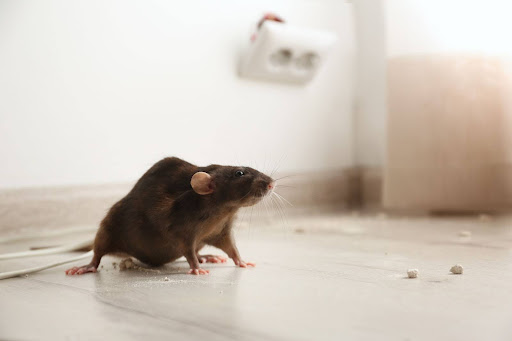Believe it or not, your sense of smell just might be the most powerful one when it comes to fighting back against rodent infestations.
The saying, “I smell a rat!” has figurative meaning, of course, but it can also be quite literal. Rats are famous for leaving behind a musty ammonia smell – it’s an unpleasant odor that can help you detect where they might be hiding and build their nests.
So if you happen to notice the smell of rats, what should you do about it? Don’t just reach for the can of Febreeze and call it a day. Take action now to get rid of rats (and the health problems they present) for good.
What’s the Smell of Rats Like?
You may have caught a whiff of something strange in your home, a certain musk that doesn’t seem to fit. While you might be tempted to dismiss it as a temporary odor, pay close attention – it could be telling you more than you initially realize.
The unique scent associated with rats is a blend of ammonia and mustiness, often described as being musky or pungent. This odor is a direct result of rat urine and droppings, which they leave behind as they scurry around your home.
Rats have a tendency to follow the same paths repeatedly, so these scents tend to accumulate in specific areas. If ignored, the odor intensifies, serving as a neon sign that says, “We’re here!”
Remember, where there’s smoke, there’s fire. The presence of this odor is more than just something that needs to be masked with a scented candle – it’s an indicator of a potential infestation.
Rats are notoriously prolific breeders, and where there is one, there are likely many more lurking in the shadows. The longer the odor persists, the greater the infestation. It’s not just the size of the rat population that determines the smell’s intensity – it’s also how long they’ve been making themselves at home in yours.
Why Rats Are Such a Problem
Beyond the unpleasant odor, rats bring with them a laundry list of potential health risks. These furry intruders can carry diseases such as leptospirosis, hantavirus, and salmonellosis.
The scent of rats is often accompanied by airborne particles of urine and droppings, which can exacerbate allergies and asthma or introduce pathogens into your living environment.
It’s a reminder that, when it comes to rats, health hazards are always part of the package.
Identifying the Source of the Stink
Once you’ve noticed the smell of rats, the next logical step is zeroing in on the source. Identifying the focal points of infestation is crucial in tackling the issue effectively, but don’t worry – your nose can lead the way!
Trust your instincts and your senses. The human nose is incredibly sensitive and can help pinpoint areas where the odor is strongest.
Common hotspots include attics, basements, and crawl spaces, as these locations tend to provide the perfect hiding spots for rodents. Keep an eye out for other signs such as gnawed wires or droppings, as these may be able to corroborate your suspicions.
Remember, rats are nocturnal creatures, meaning they do most of their moving at night. If you hear scratching or scurrying sounds in the walls or ceilings, it’s time to investigate further. Combine these auditory clues with the scent trail, and you’re well on your way to locating their stronghold.
If you’re unable to locate the source of the smell, or if the problem seems more widespread than you initially thought, don’t be afraid to call in the professionals.
Pest control experts, like our team at Natura, have the experience and tools necessary to identify and address even the most elusive infestations. We’ll be able to weed out the severity of the problem and then provide targeted solutions, ensuring that your home is no longer a safe haven for rodents.
Hire Professional Pest Control To Eliminate the Smell of Rats
It’s one thing to pinpoint the problem and quite another to eradicate it. When it comes to dealing with rat infestations, professional pest control services are your best bet for long-term success.
While there are all kinds of DIY solutions available, they often provide only temporary relief. Traps and store-bought poisons may catch a few rats, but they rarely address the root of the problem, which is often access points and breeding grounds hidden from view. By the time you’ve tackled one area, another may have already become infested.
Remember, detecting the smell of rats is more than just noticing an odor – it’s a bright red warning flag that you need to take action immediately.
Recognizing and responding to this smell ASAP can prevent a minor problem from becoming a major headache. By understanding the health risks associated with rat infestations and the limitations of DIY solutions, you’ll be better equipped to protect your home and family.
Don’t wait for the problem to worsen. If you’ve noticed the unmistakable smell of rats in your home, contact Natura Pest Control today.
Our team of skilled professionals in the Vancouver-Portland Metro area is ready to help you reclaim your living space – and make sure it remains a safe, healthy, and odor-free space for your entire family.



